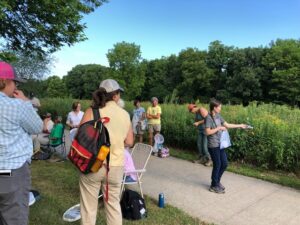Columbia Audubon Properties support Pollinators
by Lori Turner
Pollinators are needed to produce one out of every three bites of food you eat. There are over 450 species of bees in Missouri. Flies, spiders, beetles and even birds and bats can be pollinators. Insect pollinators live a portion of their lives as a caterpillar. A pair of Black-capped Chickadees will feed their hatchlings more than 700 caterpillars a day.
Pollinators are really important but they are in decline from habitat loss, pollution, and pesticides. You can help save pollinators by reducing or eliminating pesticide use in your gardens and yard and creating green spaces for pollinator habitat.

Your financial support to Columbia Audubon Society helps make these prairie projects possible and in return creates habitat suitable for declining pollinators such as native bumble bees. Donate to Columbia Audubon Society at www.comogives.com before December 31.
